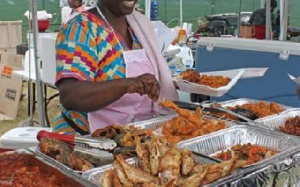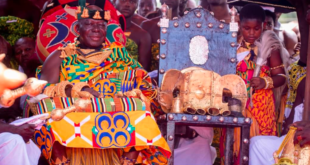The scheme, which takes effect immediately, is aimed at ensuring food sold on the streets met the basic hygiene and safety requirements to boost consumer confidence and safeguard public health.
The scheme enjoins street food vendors to apply for a permit at a cost of GHC 5.00 after which they would undergo registration, training and licensing.
Launched on the theme: “No Street Food Vending Permit, No Business”, the FDA will move to stop street food vendors who fail to acquire permits, from operating.
The Authority had consequently urged the public to avoid patronising food vendors who did not have the SFVP.
“You also have the responsibility as a consumer to help the regulators do their work by demanding permit from food vendors before buying from them”, Mr John Odai-Tettey, the Central Regional Head of FDA, advised at the launch of the programme at Kotokuraba Market on Friday.
“The fact that you are hungry does not mean you should eat anything that looks like food,” he stressed.
On how it will be executed, Mr Odai-Tettey explained that officers of the Authority would be deployed to inspect the kitchens and vending points of applicants to ensure they met the basic requirements.
“Once this is done, a permit will be issued and pasted at the place of vending,” he indicated.
The Central Regional FDA boss, further that street food vending which had become a source of financial independence for many, was also the cause of illnesses such as cholera, typhoid and diarrhoea due to the failure to observe good hygienic practices.
Mr Odai-Tettey said the purpose of the policy was not to take people out of business but to ensure safety.
He said the authority was working closely with the Food and Agriculture Organisation, Ghana Tourism Authority, Environmental Health Officers from various Metropolitan, Municipal and District Assemblies, among other stakeholders to ensure that the objective was achieved.
For his part, Mr Emmanuel Kofi Koomson, Environmental Health Officer at the Cape Coast Teaching Hospital, observed that some food vendors were indirectly killing innocent people with unwholesome food.
It was also his case that the sale of unhygienic street food had negative implications for tourism in the country.
“This is why I am very proud to say that what FDA is doing is something that we should all come together to support” he said.
Mr William Freeman Goku, the Regional Environmental Health Officer, called for an intensified education in all parts of the region and urged the FDA to pay more attention to the kitchens of the vendors.
“Let us also take our attention to bottled foods as well. Many of them are operating in darkness under unhygienic conditions”, he added.
The Queen of the Kotokuraba Market, Madam Evelyn Brown, expressed concern about how some vendors used rotten vegetables to cook to just to maximise profit, describing it as “dangerous”.
“Food is a source of life and death. Let us keep our environment and our bodies clean,’ she stated.
She further implored farmers to be measured in the use of fertilizers in planting, adding that it was affecting the quality of foodstuffs and public health.
The Queen of the Abura Market, Madam Cecilia Aggrey, appealed to the FDA to replicate the sensitisation exercise in their market and urged the regulator to enforce the law to the latter without favour.
Source: GNA
 Home Of Ghana News Ghana News, Entertainment And More
Home Of Ghana News Ghana News, Entertainment And More





